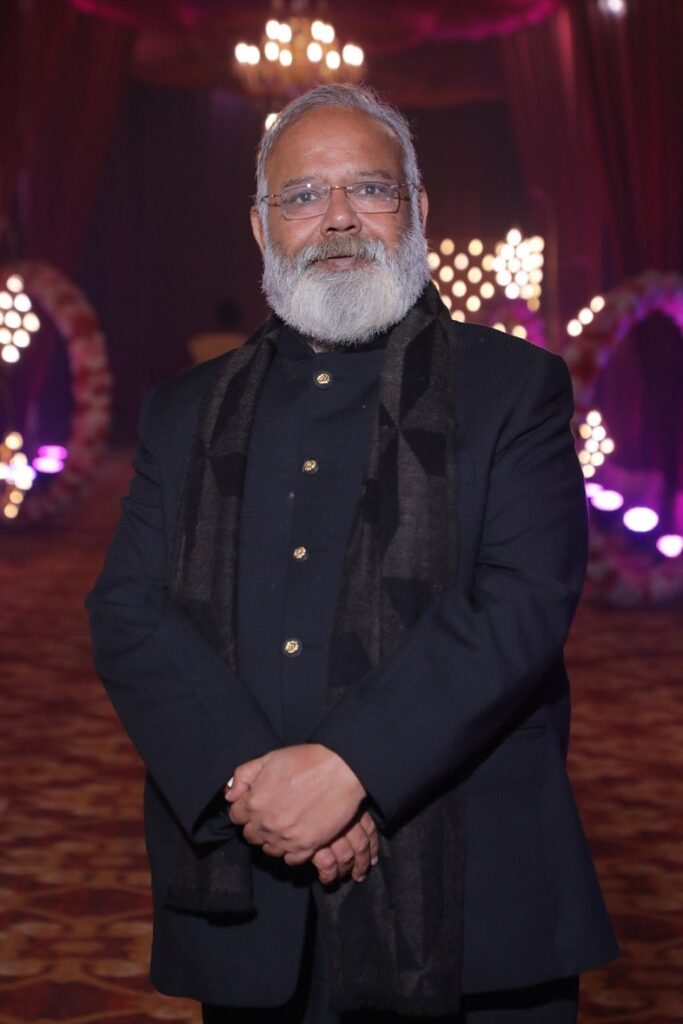 Dr. Subash Gupta, Chairman of Red Cross Society, Ghaziabad
Dr. Subash Gupta, Chairman of Red Cross Society, Ghaziabad
India is leading the global social revolution but it still lacks in terms of menstrual education and hygiene in rural areas. According to a report by Times of India, Only 42% of women in rural areas use hygienic products during their periods, and the remaining women are still unaware of proper hygienic methods; instead of using sanitary napkins, they wear clothing that can have infections or PCOD, as they lack knowledge about it. Due to this many young girls and women of rural areas suffer from the disease and they face various problems. Menstrual education is crucial for girls, women, and the people of rural areas.
Adolescent girls’ menstrual practices in rural India are negatively impacted by cultural standards and taboos. Menstruation gets mixed up with myths and misunderstandings, despite being a normal important part of female reproductive health. In rural areas, cultural and religious beliefs commonly view menstruation as impure, horrible, and even unclean to society. Due to these myths, menstruation is associated with a matter of shame. These superstitions can result in limitations on women’s period-related activities, which may negatively impact their independence, enjoyment of everyday life, and happiness in general daily routine work.
These beliefs can result in unfavorable attitudes and behaviors that negatively affect the health of women and girls. People have some myths that women who are menstruating should not touch any food item otherwise it will get spoiled or they should also not water the plants as well during that time. The families who believe in these kinds of myths end up not letting women enter the kitchen as well. Some people also connect it to religious activities and consider the women impure, and don’t let them take part in religious activities, saying that it produces negative energy around the temple and religious place.
Menstrual education is necessary for breaking the taboo and correcting misunderstandings about menstruation. Menstruation is viewed as unclean or horrible in many rural societies, which makes females feel embarrassed and low on confidence. Menstrual education helps normalize menstruation and build a feeling of pride and confidence in young girls by reducing myths and providing correct knowledge about the menstrual cycle and its biological importance.
According to a survey done by the government of India, 71% of teenage girls in India don’t know about menstruation until they go through it themselves, which indicates that parents don’t usually prepare their daughters for this normal process. Young girls in rural areas face unique challenges as they lack awareness and various factors including limited access to sanitary products, lack of proper hygiene facilities, and cultural taboos surrounding menstruation. In the beginning, getting sanitary pads and other menstrual hygiene products may be limited in rural areas due to financial limitations.
Girls are forced to wear unpleasant and unclean alternatives like scraps or outdated garments since many households cannot afford these things daily. Also, the challenges the young girl faces in the rural areas during menstruation get worse because of poor sanitary facilities in rural locations. Girls find it difficult to peacefully and hygienically manage their periods when there aren’t clean, private restrooms available, which frequently causes discomfort and shame. The lack of open communication between parents and children can lead to misinformation and fear of getting judged by parents can harm girls’ health.
Poor practices related to menstruation hygiene may result in infections of the reproductive system, fungus, and urinary tract. Girls need to be well-educated about security measures and cleanliness to avoid health issues. Due to discomfort, and lack of facilities, or a fear of shame, some girls avoid school when they are menstruating. It may also impact their academic performance since it is related to higher-level studies. Girls who are menstruating may experience bullying, humiliation, or rejection from social events. A lack of awareness and stereotypes are two factors that add to the shame attached to menstruation.
The Government of India is also running many campaigns for girls in rural areas to promote awareness and educate people about menstruation. These campaigns include:
- National Menstruation Hygiene Policy 2023: The policy states that the menstrual cycle is a normal physiological function for all individuals who menstruate, including girls and women of reproductive age. Its main goals include providing clean and respectable menstrual hygiene facilities, encouraging education and knowledge on period hygiene, promoting quality standards, and guaranteeing access to inexpensive and safe menstrual hygiene products.
- Menstrual Hygiene Scheme (MHS): Introduced in 2011 under the National Health Mission (NHM), this program aims to encourage females between the ages of 10 and 19 to practice good menstrual hygiene, reduce menstruation-related taboos, increase access to sanitary pads, and increase knowledge.
- Rashtriya Kishor Swasthya Karyakram (RKSK): Introduced in 2014 to educate teenage girls about menstruation and improve their access to sanitary pads. Thorough education and empowerment on menstrual health are included in the curriculum.
- Jan Aushadhi Suvidha Sanitary Napkin: Started in 2018, this program provides women throughout the nation with access to affordable sanitary napkins to guarantee access to sanitary and safe menstruation products.
Its goal is to guarantee women’s access to sanitary and safe menstruation products.
Other Initiatives by Non-Government Organizations (NGOs)- Several NGOs and social workers are actively trying to erase the stigmas associated with menstruation and offer long-term solutions. Dr. Subhash Gupta who is a passionate social worker has done so many things related to menstruation. He has gone to the rural areas of Ghaziabad and the government schools done the awareness campaign and has also distributed sanitary napkins to the women and the girls. He has also established vending machines for sanitary napkins in government schools. He visits the schools and the villages of different areas to educate the girls there about menstruation.
It is important to remove the shame related to menstruation health to advance gender equality, provide healthcare access, and cultivate a more accepting community. Menstruation-related taboos remain in place for centuries due to social, religious, and cultural norms. These taboos result in prejudice, judgment, and limits to resources and knowledge. Several ways may be used to overcome these barriers and promote menstrual wellness.
Correcting myths and breaking taboos both depend on education. From an early age, complete information on menstrual health should be included in the school curriculum. Young people can have a positive outlook on menstruation and gain the confidence to properly manage their menstrual health by receiving correct knowledge on menstruation, its biological processes, and hygiene habits.
Menstruation taboos must be addressed, and community-based efforts are necessary for this. Talking about menstruation with elders, religious leaders, and community leaders can help change social standards and promote acceptance and understanding. To help challenge myths and misconceptions, community seminars, talks, and awareness campaigns can offer platforms for open discussion and information exchange.
Menstrual taboos can also be challenged through the use of media and communication channels. Ads, radio shows, social media campaigns, and television shows may all be utilized to promote good images of people who are menstrual and normalize discussions about menstruation. The media may have a significant impact on shifting cultural attitudes and views by showcasing a variety of experiences and points of view.
For several reasons, menstrual education is important to boys and men. First of all, knowledge about menstruation promotes kindness and compassion for women and girls. Removing taboos and stigmas related to periods promotes participation and understanding. We create an atmosphere where males may help female friends, lovers, and family members with sensitivity and without feeling ashamed by teaching them about menstruation. The health literacy of boys and men depends on menstruation education. By being aware of menstruation, they may identify possible health problems, such as irregular bleeding or extreme menstrual pain, in their female friends and lovers and take the necessary action to seek medical attention.
Menstrual education also advances gender equality by removing assumptions and traditional gender roles. Boys’ education on menstruation as a normal part of life and not a cause for shame helps break down social norms that reduce women’s chances and maintain gender inequity. educating boys and men about menstruation may result in more inclusive policies and practices in public and workplace settings, ensuring that people who experience menstruation have access to the resources and assistance they need. encouraging respectful, educated, and gender-equitable communities requires including menstruation education in boys’ and men’s educational programs.
Promoting general health and removing misunderstandings about menstruation requires better menstrual health education. A comprehensive course of study should cover menstruation hygiene, the body, awareness of the cycle, and pain management. Talking about various menstruation products and how to use them helps people make decisions based on knowledge.
Addressing opinions and cultural stigmas related to menstruation promotes a supportive atmosphere and reduces feelings of shame or embarrassment. Being diverse is essential to ensuring that a variety of events, including those of transgender and non-binary people, are taken into account in education.
Learning about menstruation health may be made more interesting and understandable with the use of collaborative, suitable age-educational resources including workshops, films, and informational books. Through the normalization of discussions surrounding menstruation and the provision of correct information, we can help individuals confidently manage their menstrual health and lead better lives.
According to Dr. Subash Gupta, Chairman of Red Cross Society, Ghaziabad-
Education on menstruation is necessary for rural communities since it provides people with knowledge about the lack of awareness in people. In rural areas, where healthcare resources and accessibility are usually limited, knowledge about menstruation hygiene promotes equality, fairness, and respect. By encouraging self-care behaviors, breaking down stereotypes, and ensuring that people can safely and confidently manage their periods, we educate rural communities about menstruation. Menstrual education also becomes a good cause for positive social change by opening doors to more comprehensive conversations on human rights, gender equality, and reproductive health. It’s about empowering people, changing communities, and creating a future in which menstruation is no longer a barrier but rather a source of empowerment and understanding. It’s not just about periods.

